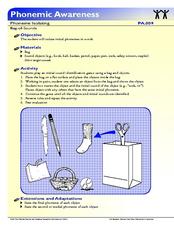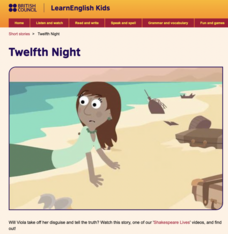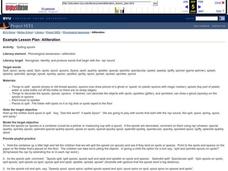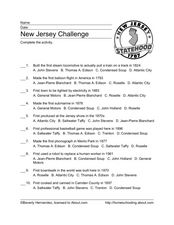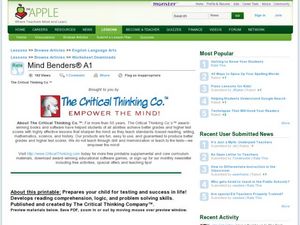K!2 Reader.com
Interrogative Pronouns
To whom will you assign this exercise that focuses on interrogative pronouns? Your students, of course! Learners complete 18 sentences by adding in the correct interrogative pronouns. The page includes a list of pronouns to choose from...
Florida Center for Reading Research
Phonological Awareness: Phoneme Isolating, Bag-of-Sounds
In pairs, pre-readers take turns holding up objects from a bag. As one child holds up an object, the other names it and says its initial letter sound. They work together to sort the objects into piles based on how they isolated and...
Florida Center for Reading Research
Phonological Awareness: Phoneme Matching, Medial Match
Early readers get together and match medial phonemes. They take turns picking picture cards from a pile; they say each word, then determine whether the pair has matching medial sounds.
Study Champs
Emotions and Interjections
Connect emotions to grammar with a grammar exercise that taps into a little bit of creativity. Given an emotion, learners come up with a matching interjection. There are 10 emotions listed.
PBS
Dear Pen Pal
Explore cultures from around the world with an engaging pen pal resource. Through a series of classroom activities and written correspondence, children learn about the favoritec pastimes, schooling, geography, and weather that is...
E Reading Worksheets
Fact and Opinion - Worksheet: 3
How can you prove a fact? With supporting evidence, of course. Learners read 25 statements and determine if it is fact or opinion. Then, if the statement is a fact, youngsters write a sentence explaining how they can prove it.
Super Teacher Worksheets
Reading a Timeline
Practice reading a timeline with this two-page worksheet that illustrates a fun week at summer camp and tests comprehension with seven questions.
Curated OER
Hanukkah - ESL
Reinforce vocabulary and reading comprehension with a Hanukkah-themed collection of worksheets. Scholars first read a two-paragraph informational text, then apply their new-found-knowledge to match phrases, fill in blanks with...
Curated OER
Beginning Daily Activities Unit
Begin each day with a warm-up that has ELLs focusing their minds on a skill that will be taught that day. Focusing on verbs, each daily lesson reinforces study and self-management skills, helps learners become proficient in working with...
Seussville
What Can Your Class Do?
Inspire scholars to do their part for planet Earth with a read-aloud of Dr. Seuss's The Lorax, and variety of activities designed to boost the environmental activist in us all. Activities include writing poems about the Earth, sorting...
British Council
Twelfth Night
Scholars experience Shakespeare's, Twelfth Night, with an engaging interactive. After watching the story, six activities extend the learning experience. Topics include characters, vocabulary, a sequence of events, comprehension, and...
Curated OER
Synonyms and Antonyms
Mix up your writing lessons by having kids look at recent newspaper articles instead of their own work. They work in pairs and rewrite sports news articles using synonyms and antonyms for a set number of words. Then they share their work...
Curated OER
Write Right!
After watching part of a Club Write Kids video and discussing the editing process, each group of learners writes a letter to a favorite author. They ask for a copy of a page of manuscript that has gone through the editing process. Prior...
Curated OER
My Spelling Dictionary
Develop study skills and improve spelling at the same time. Every time I teach this mnemonic device, the kids thank me. It makes memorizing more manageable, and fun. To remember how to spell difficult words, make up a sentence using the...
Curated OER
Proper Nouns
Use this worksheet to help your class identify proper nouns. They circle the proper nouns in 16 sentences. Answer key is provided.
Curated OER
Word Association Poetry with Visual Thesaurus (or Not)
Young poets get inspiration and guidance for making word association poems with the Visual Thesaurus. Your class could complete this project with nothing more than a pencil and paper as well. A nice one-off for a substitute during your...
Curated OER
Homographs
There are eight homograph riddles here: can your scholars figure them out? For each, there are three definitions and a picture. Learners use the picture and multiple meanings as clues, recording a word that matches all three. They read...
Curated OER
Prefixes Micro- and Mega-
Explore vocabulary context clues with a prefix activity. Using the prefixes micro- and mega-, fourth graders complete sentence frames. They then make up their own word with the correct prefixes. Helpful as homework or during a writing...
Curated OER
Dr. Seuss’s ABC: An Amazing Alphabet Book Lesson
Dr. Seuss's ABC Book is used to help young readers distinguish between the letters of the alphabet and their letter sounds. After a discussion reviewing the letters that are vowels and consonants, the book is read to the class. Then, the...
Curated OER
Alliteration
Young scholars recognize, identify and produce words that begin with the /sp/ sound. They decorate objects that have the /sp/ sound with items that have the /sp/ sound. Students create phrases with the /sp/ sound that describe the object...
Curated OER
Worksheet 1: Review: Kinds of Words
By using this activity, learners identify nouns, verbs, adjectives, articles and prepositions. Budding grammarians fill in a 24-question chart in which they use the sentences given to categorize the words.
Curated OER
New Jersey Challenge
In this recognizing facts about the state of New Jersey worksheet, students read factual phrases about New Jersey and choose answers telling who, what, or where. Students choose 10 multiple choice answers.
Curated OER
ABC Grammar Book
Elementary learners create an ABC grammar book. The project begins with class members taking digital pictures of items that begin with each letter of the alphabet. Depending on level, they then add a word or a complete sentence to...
Curated OER
Mind Benders: Name the Animals
In this deductive reasoning learning exercise, students read the clues about a cat, a small do, a goat, and a horse and identify them. Students solve 3 answers.



